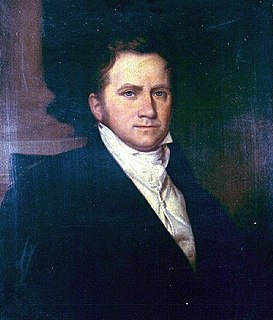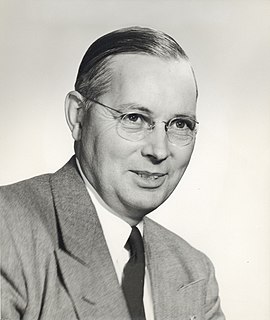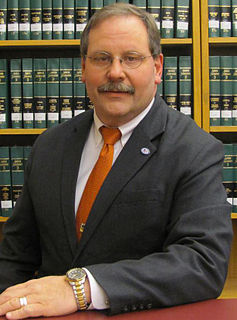
Michael Herman Michaud is an American businessman and politician from Maine. Michaud served as the U.S. representative for Maine's 2nd congressional district from 2003 to 2015. He is a member of the Democratic Party. The primarily rural district comprises nearly 80% of the state by area and includes the cities of Lewiston, Auburn, Bangor, Presque Isle, and Ellsworth. It is the largest Congressional district by area east of the Mississippi River.

The Maine Legislature is the state legislature of the U.S. state of Maine. It is a bicameral body composed of the lower house Maine House of Representatives and the upper house Maine Senate. The Legislature convenes at the State House in Augusta, where it has met since 1832.

William Pitt Fessenden was an American politician from the U.S. state of Maine. Fessenden was a Whig and member of the Fessenden political family. He served in the United States House of Representatives and Senate before becoming Secretary of the Treasury under President Abraham Lincoln during the American Civil War. Fessenden then re-entered the Senate, where he died in office in 1869.

Benjamin Williams Crowninshield served as the United States Secretary of the Navy between 1815 and 1818, during the administrations of Presidents James Madison and James Monroe.

Burton Melvin Cross was an American Republican businessman and politician. Cross was Maine's 61st and 63rd Governor, though his two terms were separated by just 25 hours.

Nathan Allen Farwell was a politician, businessman and United States Senator from Maine.

Harris Merrill Plaisted was an attorney, politician, and Union Army officer from Maine. As colonel, he commanded the 11th Maine Volunteer Infantry Regiment during the American Civil War. After the war, he served as Maine Attorney General, a U.S. Congressman, and the 38th Governor of Maine.

John Winchester Dana was an American businessman, diplomat and Democratic politician in the U.S. state of Maine. He served as the 19th and 21st Governor of Maine and as Chargé d'affaires to Bolivia during the 19th century.
Mark W. Lawrence is an American lawyer and Democratic politician currently serving in the Maine Senate. Lawrence represents Senate District 35, comprising the towns of Eliot, Kittery, Ogunquit, South Berwick, York and part of Berwick. Lawrence was born in Kittery and attended Bowdoin College and the University of Maine School of Law where he was elected to his first term in the Maine House of Representatives. He has served a total of three terms in the Maine House and is serving his sixth nonconsecutive term in the Maine Senate, where he served as president from 1996 to 2000. Lawrence was the 2000 Democratic United States Senate nominee, challenging incumbent Olympia Snowe, and in 2008 he unsuccessfully sought the Democratic nomination for Maine's 1st congressional district. Lawrence pursued private law practice for 14 years before becoming the York County District Attorney from 2003 to 2010. In 2010, he returned to private practice and operates the Lawrence Law Firm out of Kittery.

Troy Dale Jackson is an American logger and politician from Allagash, Maine currently serving as president of the Maine Senate. Jackson represents Maine Senate District 1, representing northern Aroostook County, including the towns of Fort Kent, Madawaska and Caribou. Jackson has served as Senate President since 2018.

Richard M. Cebra is an American politician from Maine. A Republican, he represented Maine House of Representatives District 101, which included Casco, Naples and part of Poland from 2004 to 2012. He was elected to the 128th Legislature in November 2016 serving district House District 68, which includes the towns of Naples, Sebago, Baldwin, Cornish and part of Parsonfield. Following his initial departure from the legislature in 2012, he served as chairman of the Maine Republican Party, from which he stepped down in 2013. Cebra is known as a social and fiscal conservative, and was a close ally of Governor Paul LePage.
Donald Frederick Collins was an American politician from Maine. Collins, a Republican from Caribou, Aroostook County, served 5 terms in the Maine Legislature between 1970 and 1992. He also served as mayor of Caribou.
Nathaniel Tompkins was an American politician and jurist from Maine. Tompkins, a Republican, was elected to five terms in the Maine Legislature, including three in the Maine House of Representatives and two in the Maine Senate. During his tenure in the House, he served as House Speaker in 1935–1936. In 1938, he was elected to the Maine Senate. After being re-elected in 1940, Tompkins was elected by his fellow State Senators to be Senate President. He was appointed as a circuit court judge mid-way through his only term as President. Four years later, on July 27, 1945, he was appointed to the Maine Supreme Judicial Court. He served in that position until his death in April 1949. He died in the Aroostook County Court House in Houlton.
Hiram Chapman was an American politician from Maine. Chapman, a Democrat from Damariscotta, Maine, was elected to eight single year terms in the Maine Legislature, including four in the Maine House of Representatives and four in the Maine Senate. Chapman was Senate President in 1857.
Henry Lord was an American businessman and politician from Bangor, Maine. Lord served 4 terms in the Maine Legislature. In 1877 and 1878, he was elected to single-year terms to the Maine House of Representatives. In 1878, he was Speaker. In 1886, Bangor voters sent Lord back to Augusta to serve in the Maine Senate. He was re-elected two years later and chosen by his fellow Senators as Senate President. He also served on the Bangor City Council.
Josiah Manchester Haynes was an American businessperson, lawyer, and politician from Augusta, Maine. Haynes was elected to the Maine Legislature five times and served as Senate President in 1879 and Speaker of the House in 1882—83. In business, he was heavily invested in shipbuilding, railroads, timber, and the commercial ice production.

While women's suffrage in Maine had an early start, dating back to the 1850s, it was a long, slow road to equal suffrage. Early suffragists brought speakers Susan B. Anthony and Lucy Stone to the state in the mid-1850s. Ann F. Jarvis Greely and other women in Ellsworth, Maine, created a women's rights lecture series in 1857. The first women's suffrage petition to the Maine Legislature was also sent that year. Working-class women began marching for women's suffrage in the 1860s. The Snow sisters created the first Maine women's suffrage organization, the Equal Rights Association of Rockland, in 1868. In the 1870s, a state suffrage organization, the Maine Women's Suffrage Association (MWSA), was formed. Many petitions for women's suffrage were sent to the state legislature. MWSA and the Woman's Christian Temperance Union (WCTU) of Maine worked closely together on suffrage issues. By the late 1880s the state legislature was considering several women's suffrage bills. While women's suffrage did not pass, during the 1890s many women's rights laws were secured. During the 1900s, suffragists in Maine continued to campaign and lecture on women's suffrage. Several suffrage organizations including a Maine chapter of the College Equal Suffrage League and the Men's Equal Rights League were formed in the 1910s. Florence Brooks Whitehouse started the Maine chapter of the National Woman's Party (NWP) in 1915. Suffragists and other clubwomen worked together on a large campaign for a 1917 voter referendum on women's suffrage. Despite the efforts of women around the state, women's suffrage failed. Going into the next few years, a women's suffrage referendum on voting in presidential elections was placed on the September 13, 1920 ballot. But before that vote, Maine ratified the Nineteenth Amendment on November 5, 1920. It was the nineteenth state to ratify. A few weeks after ratification, MWSA dissolved and formed the League of Women Voters (LWV) of Maine. White women first voted in Maine on September 13, 1920. Native Americans in Maine had to wait longer to vote. In 1924, they became citizens of the United States. However, Maine would not allow individuals living on Indian reservations to vote. It was not until the passage of a 1954 equal rights referendum that Native Americans gained the right to vote in Maine. In 1955 Lucy Nicolar Poolaw (Penobscot) was the first Native American living on a reservation in Maine to cast a vote.
Mary Caroline (Carrie) Burpee Shaw was an American composer, music educator, and pianist. She published her music under the name Carrie Burpee Shaw.











